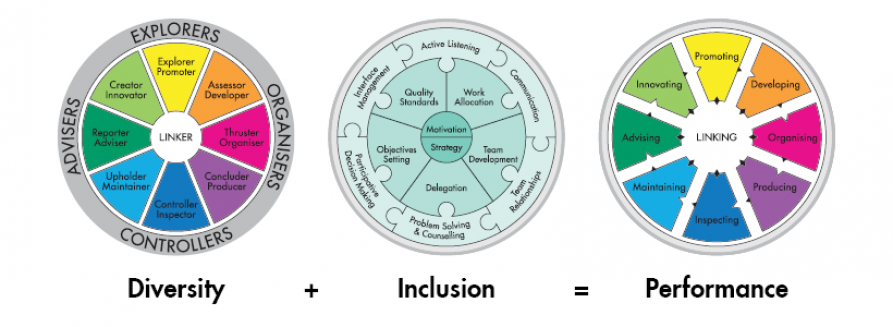How does TMS fit into the Inclusion and Diversity conversation?
The Team Management Wheel provides a simple, constructive and strengths-based approach to difference through the lens of work preference. Although we may be skilled at acknowledging differences, it is a further step to actively foster inclusion.
Within the TMS framework, the Linking Skills Model offers a key competency set to help develop and maximise the inclusion of, and contribution from, diverse team members.
Also recognising that organisations need to identify a performance gain from the collaboration between diverse individuals, the Types of Work Wheel provides insight into how team performance can be achieved. 
Key Themes in Inclusion and Diversity
Organisations must understand and work with differences
Diverse thinking and different perspectives are needed if organisations are to solve complex problems of the future. Establishing common ground is a key factor in this process–once achieved, lateral connections can be improved exponentially. We can build our understanding in order to better adopt diversity by using different lenses and tools, such as TMS.
A focus on the individual is essential
Every individual needs to feel included and valued. As an organisation, this means acknowledging the whole person and all that they bring.
A top-down approach is needed if these initiatives are to succeed
Senior leaders should personify diversity. This means doing more than just endorsing a policy: all levels of the organisation need to be involved, with passionate advocates devising and implementing action plans across the wider organisation.
Raised self-awareness is central to addressing unconscious bias
Self-awareness and emotional intelligence training is critical to helping people understand each other and communicate more effectively. A key insight is that leaders’ competencies need to be developed to create greater self-awareness, so that conflict can be addressed productively. The TMP has already been used to reduce the risks associated with unconscious bias.
Intersectionality needs to be considered
When we look at multiple elements of diversity in combination–for example ethnicity, gender and age–we need to be mindful of the compounding impact on an individual’s experience and identity. Our programmes work best when we consider how complicated attitudes towards diversity can affect all areas of an employee’s life.
Programmes need to foster compassion in corporate life
We have to think about the human effects beyond policy and initiative, by encouraging a culture of compassion to develop within organisations. There is no place in any corporate culture for ignorance or discrimination. At the same time, we need to be sensitive to lifestyle factors and how can they impact on some of our more significant initiatives.
Initiatives cannot be tokenistic and must deliver a performance gain
Inclusion programmes should work at the grass-roots level and be designed to genuinely empower people. Skills training or hosting effective meetings can encourage people to call out non-inclusive language and behaviour, which helps to create safe, supportive workspaces.
Impressive returns have been recorded by organisations with diverse leadership and, without assuming causality, we have to ask, ‘why wouldn’t you foster diversity?’ It’s possible to see a change in the bottom line when people are hired who look, think and make decisions like your customer base.